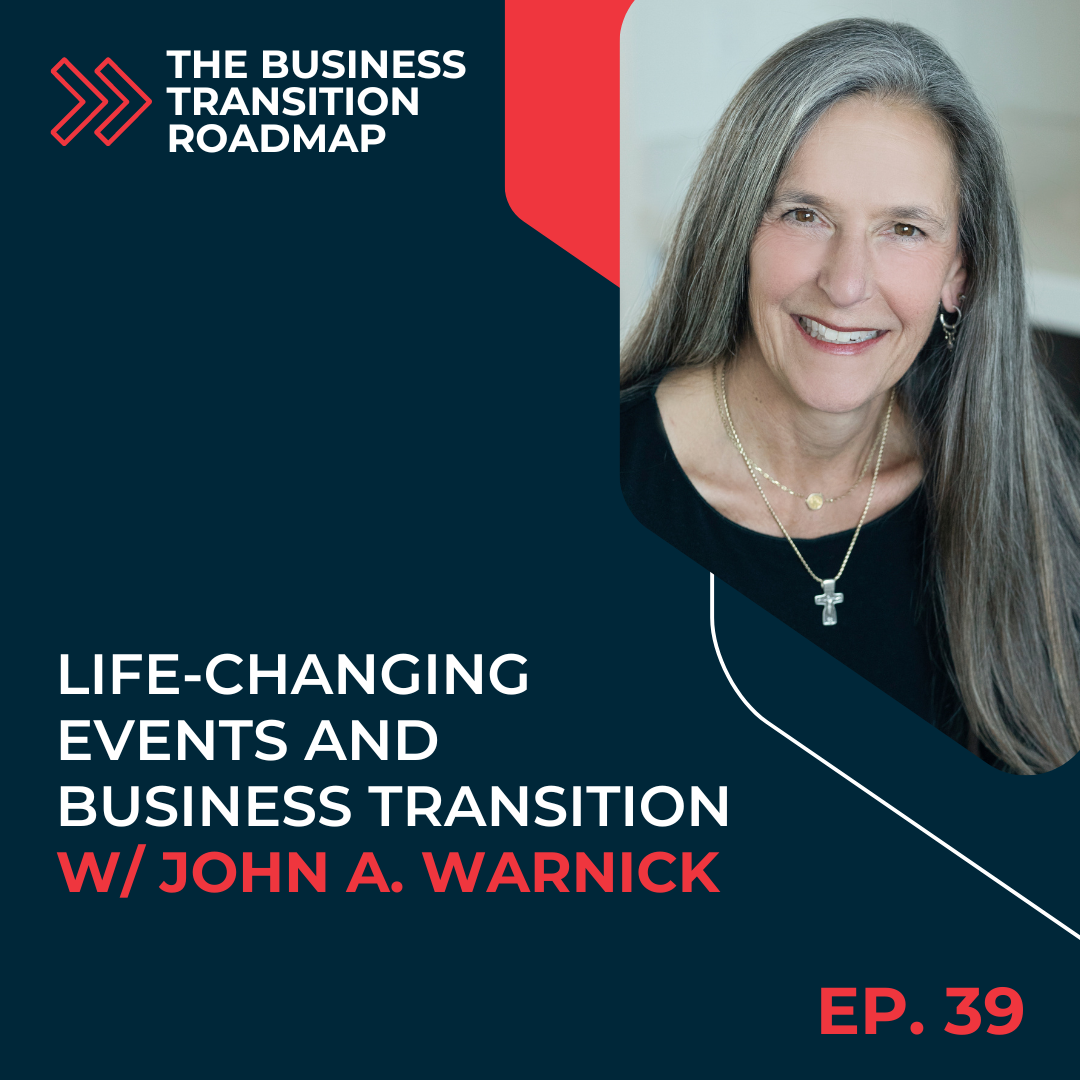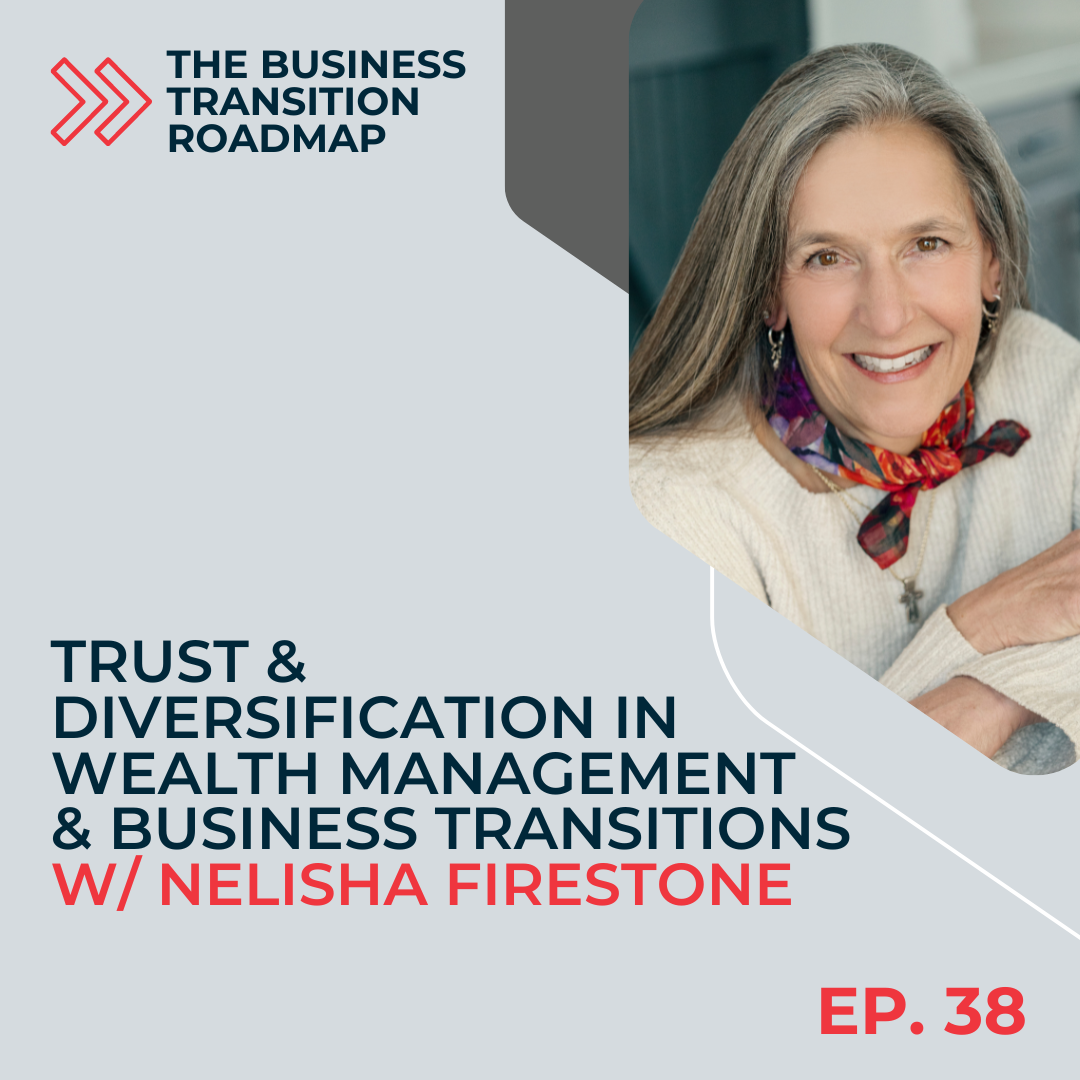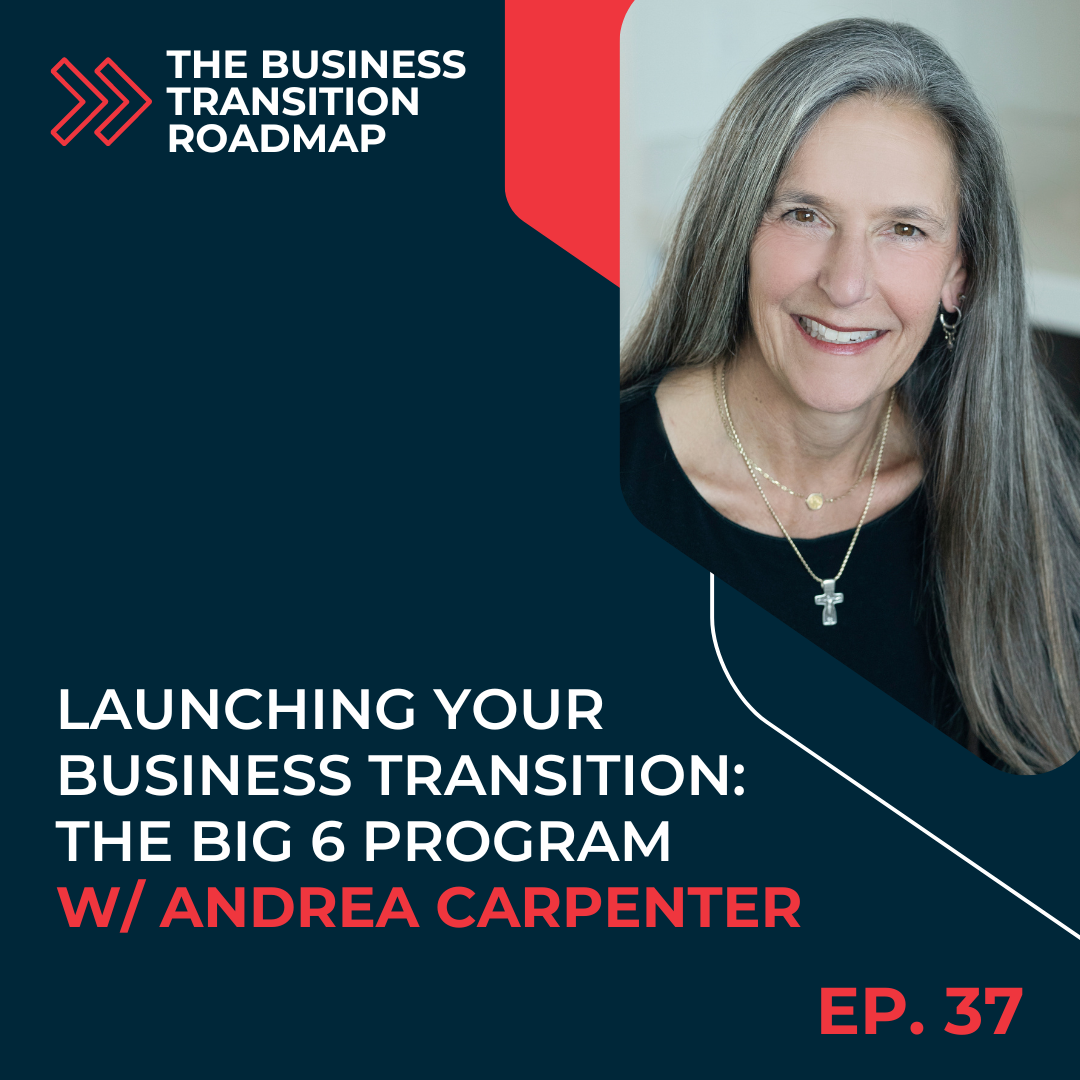Episode Description:
Did you know that 80% of business owners do not have any idea how they’re going to transition their business? Most of the time, they think transitioning is a future event to worry about later, but that couldn’t be further from the truth. In fact, a lack of planning and intentional preparation is what causes them to get stuck when it’s actually time to transition. Tap or click the play button below to listen to: Why Business Owners Get Stuck in Their Transitions.
In this episode, you’ll find out the importance of preparing yourself for the transition journey in advance. There are so many pieces to be moved and tasks to be completed along the way that trying to do it all at once just won’t work. Learn how you can set yourself up for less stress and more options when you’re ready to move on to your next adventure.
Connect with Elizabeth and the Transition Strategists:
Website: https://transitionstrategists.com/
Facebook: https://www.facebook.com/thetransitionstrategists
LinkedIn: https://www.linkedin.com/company/transitionstrategists/
This episode was produced by Story On Media & Marketing: https://www.successwithstories.com.
Why Business Owners Get Stuck in Their Transitions Transcript
[00:00:00] Elizabeth Ledoux: Hi, and welcome back to the podcast. Today what we’re gonna talk about is why owners get stuck and don’t want to, or don’t plan for their business transition. It’s a very, very common thing. If you, while there have been some surveys that have been done over the years and survey says 80% of business owners.
[00:00:23] Do not have any idea whatsoever how they’re going to transition their business. They’re just going to to work day to day. They’re running their business, they’re doing a great job, um, still in business. However, they have absolutely no idea what their plan is to transition. So, so, uh, , most of the business owners think about transition as an event.
[00:00:50] So one of the things that I believe is that business owners, when they think of it as an event, um, one, they decide, Oh gosh, I’m not even close to ready to being ready to leave. And so I just think of it as an event and I’m so far away I don’t have to do anything to get ready. not true, in my opinion. So, but what that does is it just delays the, the planning and delays the intentionality of becoming prepared.
[00:01:21] So one of the things that I like is to think of a business transition as a journey. Um, there are many, many, many things that have to be done in order to get to the actual final transaction, transition of the equity. So there are a lot of tasks and things like that that have to be moved onto to somebody else.
[00:01:45] Uh, also the equity and what we talk about. And what we work on in this podcast. And then also, um, our company is we work on internal transitions. Internal transitions typically are transitions that are to an employee, to another partner or to a kid, a child or a family member. Those transitions, , when those happen, the people who are going to be your successor, the people who are coming in typically don’t have very much money, which they don’t have, you know, um, a whole bunch of cash sitting on the sidelines just waiting to come in and pay you millions of dollars for your business.
[00:02:33] So, If, if it becomes an A journey instead of an event, and if you start early enough, what happens is you give yourself time to have more options. So one of the things that I believe, again, that keeps a business owner stuck is the idea that. A transition is an event. We like to think of it as a journey, um, journeys that we, I like to think of the journey somewhere between two and 10 years.
[00:03:03] So if you’re thinking about getting out in two years, three years, five years, 10 years, um, not a bad time to start thinking about how you’re actually going to do that.
[00:03:17] Second reason why I think owners. Find that they are, that they just get stuck is they start with the how and the how much. So they dive into this business transition and they go, Oh my gosh, how am I gonna get this transitioned? How, how, how? And then they think about, well, how much, um, how much do I want?
[00:03:40] How much do I need? How much is it worth? How. Then they start going to their advisors and their advisors. They go see their cpa and their CPA says, Well, um, your business might be worth about this much. Maybe the CPA tells them, um, or a financial advisor might tell them the same. And they also start to, The CPA also starts to talk about taxes and how to be tax advantaged and how that might work.
[00:04:07] And you know, they put that tax. Um, that tax thought out in, in front of the business owners. So they’ll put that out in front of you. The other thing that people will do is they’ll start to go talk to the lawyer, right? The attorney and the attorney starts talking about, um, different ways and different methods and some of the things that need to go into the agreement and things that you’re gonna need to talk, think about, et cetera.
[00:04:36] Business owners get overwhelmed with that kind of thing because they’re talking to their advisors and their advisors are wonderful. I, we work with advisors and I believe it takes a team to get this transition and transaction done. Always, it takes a team and sometimes it’s a team of five or six different advisors that you’re gonna be working with to get this all done.
[00:05:00] So we want the experts, it’s just that we want the expert advice in context with what you want. So by starting with the how and how much, typically what happens is the owner really hasn’t decided what they want and how it’s, how they would like to see it, their perfect transition and succession. So they go and get the how and how much and their heads start to spin.
[00:05:24] So we do this workshop and I did a workshop and it, I happened to have a father-daughter who was in the workshop and I had known them from a prior time. So the father daughter, she’s sitting there and we’re going through this workshop and she comes up to me after the workshop and she goes, Oh my gosh.
[00:05:44] She goes, I need to get my dad and I restarted on this process. She said, We did exactly what you said. We went and did the how and how much, and that was two years ago. We haven’t talked about it since. Why? Because their heads were spinning. They didn’t know what to do. and they, the dad actually couldn’t figure it out because there were siblings involved, potential gifting involved, equality and fairness involved, um, running the business, him leaving and what he would do because he wasn’t, he didn’t, he wasn’t ready to leave her coming in.
[00:06:26] The daughter and the mom was in the business too. So all of these moving parts, unknown. The how and how much come along and they just stop talking. You know, time continues to go on. So two years pass by. Dad’s two years older. Daughters got two more years of experience. She’s feeling more ready. , but still no progress on this succession and transition plan.
[00:06:56] So I think that one of the things that keeps owners from really moving forward and gets them stuck is this whole how and how much coming first they end up with too, too many choices and. They put too many things in the way of, there are too many unknowns, so they put too many things in the way of actually doing the planning, and so they stop.
[00:07:19] They just go back to saying, I don’t have time for this. It’s a long ways away. It’ll all work out, and I’ll tackle that later because I have my business to run, and that’s what’s most important today.
[00:07:35] when you don’t have context and you don’t understand what you truly want, it’s very difficult to, to, with intention design, a great transition strategy. So recommendation to you and what I’ve found to be very, very successful is for owners to start with their why. . Um, and I think of the why as, you know, why am I doing this?
[00:08:03] But I also think of it as, um, what do I want? Because all the different things that you want for you and for others, that cumulatively is your why. So what do I want for myself? When I imagine myself being gone and out of this business and out of this company, and I don’t have to get up anymore and I don’t have any decision making and I don’t own it, Um, what am I gonna do?
[00:08:32] What am I gonna do to be fulfilled? What am I gonna do to be happy? , I’ll have maybe some money in the bank, which would be great. And I’m financially stable, so I kind of have freedom of time and freedom of money. What am I gonna do to be happy? Big, big, big question. And then what about if you have a spouse or a significant other?
[00:08:55] Um, what do they wanna do? I can tell you that, uh, those are really interesting conversations. Sometimes when we walk through our work with people, uh, they, the owner thinks they know what their spouse wants, but they haven’t had the conversation. And we even have one, um, one event we were walking through and building a transition and.
[00:09:22] Um, the husband actually was completely burned out. He wanted to be out of the business. He was completely done with it. We bring the spouse in who also is working in the business. They come in and we start working through their objectives with them, because you don’t have to know what you want before you start planning, before you start the process.
[00:09:41] Part of the process is to understand what you want. That’s the good thing about it. So she comes walking into the meeting and sits down and we’re walking through the objectives and she. Well, we can’t sell this business because our kids are in this business and our niece is in this business, and our family’s in this business, and we have to keep this business, and you’re not ready to leave, so you’re just gonna have to get it together.
[00:10:05] Real interesting. They ended up making some changes, kept the business kids, bought the business, all worked out, but they were going to a third party because he was tired and ready to leave. That was his idea. So, , what do you want for yourself? What does your spouse want in their life? In their life? Um, what do you want as a team?
[00:10:29] Um, if you have a spouse or significant other. I have a absolutely wonderful past business partner of mine who was a PhD psychologist, and I always share, um, the idea of I’m me and you, are you. And then we are us, right? So what do we want together? Because we want each one of the people to be individuals and independently happy.
[00:10:52] But then there’s, we are us. What are we doing? Um, if you’re no longer working, If he or she is no longer working, what are you doing and what are you doing together? Because again, freedom of time, freedom of money, what does that look like? What are you doing with your kids and your family? Maybe extended family and then go into the business.
[00:11:12] Um, part of what makes up your why is. What do I want for the business? What do I want for my partners? What do I want for my employees? What about the customers? Um, who do I wanna take care of? All of these things collectively create your why. And if you can figure that out, then typically it’s much, much easier to figure out who is the right person to take it over.
[00:11:37] Um, what is the right strategy, how you’re gonna do it, and how much you need. Um, also because. envisioned your next adventure, your what you’re gonna be doing, and all those things cost money. So making sure that you are financially ready to live that next adventure and live that life that you envision.
[00:11:58] It’s a lot of fun anyway, so when you start with your why, and you take a little bit of time to do that, it could be months, it could be days, but you take a little bit of time to do that, Ask what you. of yourself, and then you ask, you know, What is my spouse or significant other one? And you can even ask what your kids want if they’re old enough, then you create that.
[00:12:21] Why. So basically to conclude this, the reason why owners get stuck in my opinion, and they don’t plan for transition is because they think of it as an event. so they have a long time to get ready for it. It’s very complicated and has a lot of moving parts, so they really don’t want. dive in. It’s very, it is very complicated and it’s got a lot of moving parts.
[00:12:48] And they start with the how and the how much. So when they do dive in, they go right to the how and how much, and they forget their why. They forget their what? What do they have to transition and want to transition? They forget their who, who are candidates and really understanding that and they forget the when and there are many wins.
[00:13:07] We’ll talk about that another time. So in conclusion, um, I would just like to, in a way, ask you or challenge you to sit down and write out what’s your why, um, what do you want, what are your objectives for you and for others? Because as a business owner, typically you serve so many people and for so many years you’ve cared for them.
[00:13:33] Um, how would you like to care for them in the future when you’re not running and owning the business? And if you want. We have a worksheet that we use called the Objectives Matrix, and if you wanna reach out to me, I would, um, be happy to share that with you. So that’s, it’s a, just an Excel spreadsheet.
[00:13:54] Super easy to use, but it puts, got some instructions and things and it really works well. So write down your why. Start there and hopefully you’ll get started on your business transition planning and design a great roadmap forward.
The Business Transition Roadmap with Elizabeth Ledoux
How do communities thrive? When businesses experience healthy growth and transition. Join CEO of The Transition Strategists, Elizabeth Ledoux as she and her guests identify what makes a successful business transition roadmap. If you know you want to transition or exit your business “one day”, today is the right day to start planning. This show will give you the roadmap.




